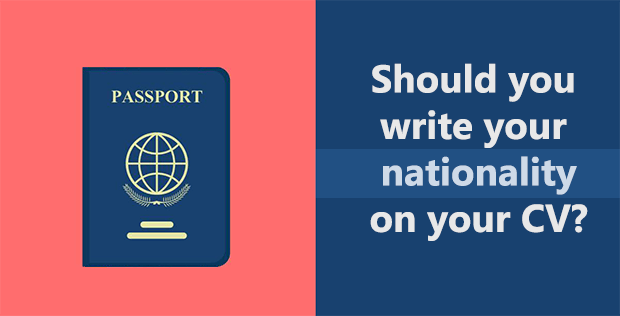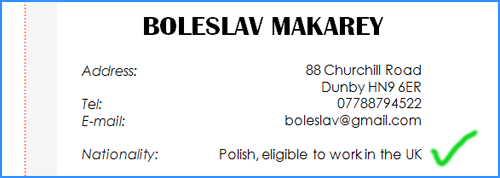 Sobhan Mohmand, Career Expert
Sobhan Mohmand, Career Expert  5 January 2023
5 January 2023

A common question we are often asked is,
“Should I include my nationality on my CV?”
The answer is, no, in most circumstances, you should not include your nationality on your CV. It is not a legal requirement nor is it something that the recruiter is interested in immediately upon receiving your CV.
At this early stage of the recruitment process, employers assume that you have the right to work in the country unless there is reason to believe otherwise.
There are certain situations in which mentioning your nationality can be helpful to your application, for example, if you are a foreign national or you apply for government jobs that require “special allegiance to the state.”
Employment discrimination laws in the United States (8 USC § 1324b – Unfair immigration-related employment practices) and the United Kingdom’s employment equality laws (primarily derived from the Equality Act 2000) and similar legislation in many other western nations prohibit discrimination based on race, colour, or nationality/citizenship.
Therefore, writing your citizenship on your CV is not a legal requirement for employment and it may open the doors of discrimination and prejudice against you.
Many countries, including the UK, have strict guidelines regarding the employment of workers from other countries, and employers could face legal prosecution if they employ someone without the right to work in that country.
When assessing your application, employers are primarily interested in your eligibility to work in that particular country (e.g. visa, work permit, etc.) and less so in your nationality. Employers can hire foreign nationals with valid work permits, they don’t need to hold the citizenship of the country.
If the eligibility to work can be easily derived from the name – e.g. Harry Davies applying for a job in the United Kingdom – then there remains little or no reason for Harry to include on his CV that he’s a British National.
Besides your nationality, the following are some other personal details that you do not need to include on your CV:
As stated previously, the general rule in regard to nationality on a CV is that it should be omitted. The valuable space that would be used for this information can be better utilised for more important information such as your work experience, education and qualifications.
However, as is the case with every general rule; there are some exceptions.
1. EU Nationals
If your background and experience are predominantly from another country, it may be helpful to state your citizenship/work status. This will help the employer know whether you are immediately available to work.
Rachel Bishop-Firth, an experienced recruiter and personnel manager, writes in The Ultimate CV: Win Senior Managerial Positions with an Outstanding Resume (pg.94):
“If you are a foreign national but have a work permit or do not need a permit to work in this country, make a brief note of this fact. If you have been living in this country for a number of years it can be helpful to state this, as it indicates a familiarity with the culture and language.”
EU citizens can live and work in the UK but need to apply under the Skilled Worker Visa or EU Settlement Scheme (EUSS). You could mention your nationality alongside the name of the scheme under which you have the right to live and work in the United Kingdom.
2. Non-EU Nationals
It is recommended for non-EU Nationals, often students who are restricted on the number of hours they are allowed to work, clearly state their eligibility for employment in the UK.
For example:
The UK Council for International Student Affairs provides detailed information on international students working in the UK.
3. Applying for jobs in non-Western countries
The third scenario in which you should mention your nationality on your CV is when you’re applying for a job abroad.
Many countries in the Middle East and Asia presently do not have any anti-discrimination laws. For instance, let us consider Dubai which is a popular destination for foreign workers of many different nationalities.
In Dubai, employers can, based on the nationality of an applicant, decide whether they will be hired or not. Citizenship is also a significant factor in determining their salary; Emiratis and Westerners are paid the highest; followed by Arabs, Asians and Africans.
The inclusion of a candidate’s nationality is a must in Dubai and its omission can result in the application being unsuccessful.
4. Applying for certain governmental jobs
There are some governmental jobs, both civil and security, for which eligibility is partly based one’s citizenship of that country.
These types of jobs typically require “special allegiance to the state” and are strictly reserved for the nationals of that particular country.
The UK’s Civil Service guidelines state:
In this case, all applicants should clearly state that they meet this requirement to avoid delays with their job application.
You should mention your nationality with other personal information such as your name, address, telephone number and email address:

You can also use other wordings, depending on your circumstances:
You can also disclose this information on your cover letter or the job application form (if appropriate).
Certain applicants worry about their “foreign-sounding names” and how this may affect their job application.
In this day and age, this is not something to worry about.
The world has become a “global village” and recruiters in the UK – and around the world – are used to the fact that eligibility to work cannot be derived simply from the names of the applicants.
If you do decide to include your nationality on your CV, make sure you don’t confuse race/ethnicity with nationality.
For example, the nationality of a person holding citizenship of the United Kingdom is “British”, not “English”, “Scottish”, “Welsh” or “Irish.”
A person’s nationality is irrelevant to one’s race or ethnic origin.
There may be a number of benefits associated with disclosing your foreign nationality on your CV or job application:
These benefits may be quite limited – if any – and do not apply to the majority of jobs. That’s why the general recommendation is to not mention your nationality on your CV unless absolutely necessary.
In most cases, it is recommended to omit your nationality from your CV as there is no legal requirement, it can open the doors of discrimination against you and it won’t add any value to your job application.
Only in very exceptional circumstances (as outlined above) do you need to disclose this personal information on your CV or job application.
The focus of your CV should be on your educational background, work experience and skills rather than on the citizenship you hold.
Good luck with your job hunt!